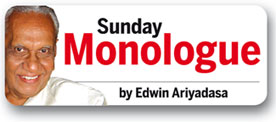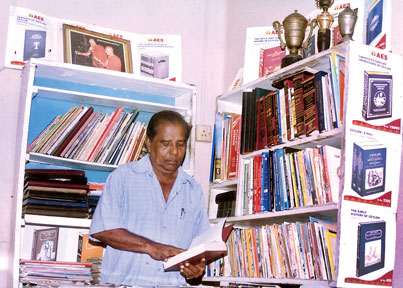A man for all book seasons
 "Books are the quietest and most constant of friends, they are the
most accessible and wisest of counsellors and the most patient of
teachers." "Books are the quietest and most constant of friends, they are the
most accessible and wisest of counsellors and the most patient of
teachers."
- Charles W. Eliot (1834-1926)
Of all artifacts of human culture, the Book is perhaps the most
wondrous product. As an authority has put it, "Writing is the basis on
which all our culture rests and the guarantee of its survival."
Emerging out of the wonder of writing, the 'Book' has incarnated as a
daily miracle in human life. The use of the book and its ubiquity are
taken for granted. The general assumption seems to be, that, they have
always been there.
Yes, the concepts of the 'book' has been around for ages - but, in a
variety of forms, sizes and in a wide range of materials. We are so busy
consulting books that, we have hardly any time, to look back upon the
tortuous but picturesque path trodden by this ever-present 'marvel'. The
Mesopotamians (people who lived in the land of the Twin Rivers, Tigris
and Euphrates) utilized clay-tablet as 'books'. The brimming rivers
deposited thick layers of clay, which became material for their
clay-books. Marks were made on the wet clay with a chisel, and the
clay-tablets was either dried in the sun or were fired in a kiln. The
first library of mankind, had been established in Ninereh in the
Mesopotamian region.
Invariably these clay-books would have been quite heavy, indicating
an impressive affection for books on the part of those who patronized
libraries.
In ancient Egypt the books were made of papyrus - the leaf of a
river-reed. Sacred scribes, wrote on these leaves, with brushes and ink.
This form of writing received the appellation 'hieroglyphics' (Priestly
writing). In ancient China, the royal writing material was silk. The
ordinary people, invented paper, which became the universal substance in
book manufacture.
 |
|
A. P. Kuragama and
friends |
The Chinese invented printing, and recorded one of the greatest
achievements in human culture with the movable type. This ushered in the
Mass Book. Fro China, printing spread westward enabling the dawn of the
Age of In cunabula (1450-1500). "In cunabula" implies, the Infancy of
Printing. It also means "Cradle Book."
It is during this age, that an intense love of books, surfaced among
those who cherished creative printing of books. Even today, Libraries
prize the books of this Age quite highly. Most of them were ornate. The
text was enhanced with exquisite illuminations and reburics. These still
remain exceedingly esteemed 'collectors' items.
You may wonder, why I have launched into the history of books, with
such keenness. This is my preliminary, to the point I am eager to make.
Let me begin with a simple question. Do we have here in Sri Lanka,
this deep adoration for books? Are their dedicated book-lovers in our
country?
The Annual Book Exhibition, Sri Lanka continues to hold, brings
together, in substantial groups, those who obviously entertain an ardour
for the Book.
Among those thronging enthusiasts, I discovered an individual, whose
affection for books has remained undiminished throughout his life. He is
not merely an emotionally moved devotee of books. He supports his
affection for books, with expertise and an admirable sense of authority.
He maintains a low profile and does not make any effort, to make his
presence felt.
Ariyawansa P. Kuragama by name, he has been with books from his
childhood on. Currently he is part of Asian Educational Services, with
its Head Office in New Delhi.
He is a mobile ready-reference mechanism for rare books and
significant authors.
As a student, his daily life was spent in a bookshop run by his
uncle's son A. P. Dias. Eventually he promoted himself into the status
of a book shop owner, by setting up Ajanta Bookshop in Pettah.
He converted this bookshop, with a modest centre for rare books. He
himself evolved into an aficionado for rare books, first editions and
works that book-lovers are generally keen to possess. With the passage
of time, the reputation of his bookshop spread abroad among those, who
have fascination for collector's items.
Kuragama's conversations are replete with charming anecdotes about
his super clients, who would drop into browse and acquire, volumes that
intrigue them.
Among the were President J. R. Jayewardene, President Ranasinghe
Premadasa, G. G. Ponnambalam, Peter Keuneman and S. Nadesan.
His shelves accommodated such 'gems' as the works of James Emerson
Tennent, Robert Knox.
As the owner of a bookshop, he was unusually humane. He narrates the
story (keeping the personalities anonymous of course) of a young female
student of Medicine. Kuragama noted, that she spent hours in his
bookshop, strenuously copying vast chunks from an expensive textbook. He
gave the student that particular book and other text-books ensuring her
success in studies.
As a successful medical person, Kuragama recalls with high respect -
she reciprocated in gratitude, when Kuragama's mother was seriously
ailing.
He is not at all the kind of person you could write about adequately.
In order to savour the full measure of his expertise in rare books, you
must initiate a conversation with him. The love of books, he has stored
in his mind, will invariably overwhelm you. His familiarly with men and
women of letters, is equally impressive.
A recent tragedy has scarred him sorely.
He lives in Boralasgamuwa. A flood that occurred due to unmanaged
drainage, toppled a whole shelf of his rare books. He has been able to
retrieve most of the precious volumes, that were soaked. through and
through. He is optimistic, that the books can be fully restored, through
a process of comprehensive drying.
I put him a pointed question: "In the world of electron displays,
with the computer screen taking over, will the printed book set outmoved?
Will the book become passe?
His spirited rejoinder in "No": He makes a solidly valid point. When
books are collected, they become family heirlooms - with their value
accruing with the passage of years. Besides, he observes, the inner
satisfaction, that a reader experience, when handling book "physically",
can in no way be replicated when you utilize the display - screen.
He makes an earnest plea. Those in authority should see to it that
ancient Sinhala classics are reprinted and popularized. He qualifies his
statement. Classics of other religious - Hindu, Islam, Christianity
etc., should also be make available in print.
This moral stand, is quite apt for Sri Lanka. We are the first
country in the world to transfer the Buddhist scripture to books. This
was during the reign of King Vattagamini (29-17 BC). Until then, the
scripture of Buddhism was continued in mnemonic-tradition.
Ariyawansa P. Kuragama's words should guide us. If we do not derive
the culture and morality. That the wisdom enshrined in those precious
works could impart, exhibitions and enthusiasm for books will not be
spiritually fulfilling.
Meantime, if you need a classic, a rare book on Sri Lanka, a
collectors; item, Ariyawansa P. Kuragama, will direct you.
During the national book seasons, a dedicated lover of books, like
Ariyawansa P. Kuragama should be especially celebrated.
Such an initiative is morally elevating.
|

